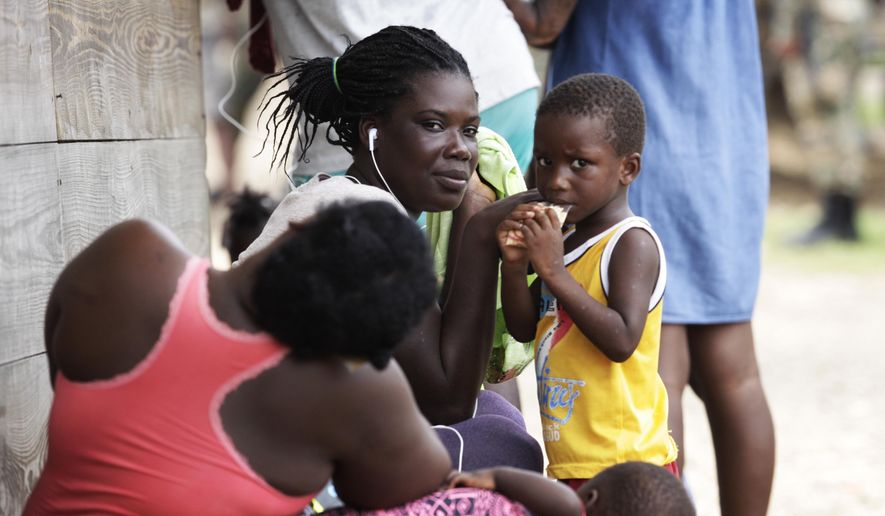A U.S. congressman’s shocking account last week of migrant abuse in Panama, including incidences of babies being washed downriver, is being echoed in a new report from Doctors Without Borders, which says staffers in the region are seeing a stunning number of sexual assaults of migrant women.
The humanitarian group said it sent medics to Bajo Chiquito, the village migrants arrive at after crossing the treacherous wilderness jungle of the Darien Gap, which lies on the border between Panama and Colombia. Migrants coming north from South America have to either boat around the jungle or cross it — the cheaper, but far more dangerous option.
“The walk can take between five and 10 days, depending on whether it’s the dry or rainy season. We’ve been told about instances of violence and robberies, and a lack of food and water,” said Raul Lopez, a project coordinator for the doctors’ group. “Our patients have seen other migrants who have not been able to carry on due to exhaustion or who have drowned in the rising rivers.”
A big concern, he said, was the number of women they are treating for sexual assault. The first day they were in Bajo Chiquito they recorded five cases of women assaulted in the previous three days, which means in the Darien Gap.
Those same teams of medics have worked the migrant routes in Mexico and “had never seen such a large number of cases in a single day,” Mr. Lopez said.
One woman the organization encountered reported coming through the Darien Gap with a group and coming face-to-face with armed bandits. The Cuban woman said some of the women were “raped in front of everybody.
“Even me too… they abused me too. They killed people, innocent people, in front of you, bleeding to death in front of you, without being able to do anything, without being able to help,” the woman said, according to the group.
Those sorts of stories closely track with what Rep. Tom Tiffany, Wisconsin Republican, saw and heard during his own visit late last month to the region.
“People were coming out of there, some could barely walk, most people were limping. Some people looked like they were about to get gangrene,” the congressman told The Washington Times. “I saw a woman being wheelbarrowed into that health facility. We heard stories from villagers of babies washing down the river that had died en route through the Darien Gap. The human misery is awful.”
His report drew scorn from some on the left, including Rep. Mark Pocan, who mocked Mr. Tiffany for taking “a nice vacation,” and insisted the Darien Gap wasn’t a worry for migrants.
“I’ve been to the Darien Gap backpacking. It is swamp 10 months of the year,” the Democratic lawmaker tweeted. “The Pan-American highway was never completed due to its inaccessibility. People just aren’t coming via there. But hope you had a nice vacation.”
Mr. Pocan’s office didn’t respond to a request for comment on whether he also disagrees with Doctors Without Borders’ account.
But even before the new information, international migration organizations had pointed to the surge of people coming through the gap, undercutting Mr. Pocan’s claims that people don’t use it as a route.
The horrors of Bajo Chiquito raise big questions about the current migrant surge and what can, or should, be done.
Mr. Tiffany said the Biden administration has invited the surge through its words and actions, creating incentives for people to make the journey north to reach the U.S.
Indeed, new border numbers show the past three months have been the worst three-month period since 2000, with 532,225 border jumpers nabbed at the U.S.-Mexico boundary.
During the Trump border surge in 2019, the worst three-month period saw just 357,262 border jumpers caught.
The Biden administration has been unsteady in its response, at times insisting the current surge is normal while also tapping the vice president to try to do something about it. Her focus, though, is long-term nation-building in Central America to try to keep people from leaving in decades to come, which experts say has little effect on those making the journey right now.
Doctors Without Borders called for Colombia and Panama to take steps to create a safe migration route between their countries to prevent the abuses they’re seeing.
“No one should face what our patients go through just for trying to migrate. Migration is not a crime,” Mr. Lopez said.
• Stephen Dinan can be reached at sdinan@washingtontimes.com.




Please read our comment policy before commenting.